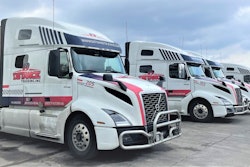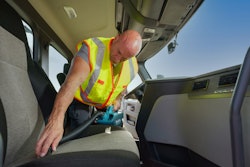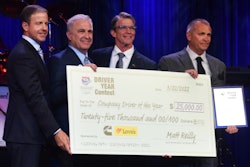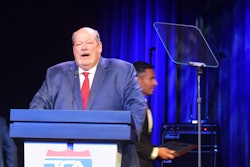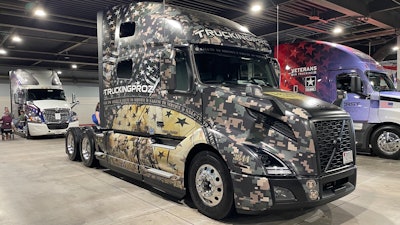
Hiring military veterans as truck drivers can do more for a fleet than just fill empty seats. That was the message from veteran advocacy groups and fleets during a session last week at the Mid-America Trucking Show in Louisville, Kentucky.
Dave Harrison, Executive Director of Work Force for Fastport, outlined the benefits to fleets of recruiting veterans, which includes a much lower turnover rate than non-military veteran drivers, fewer safety violations and a bevy of “soft skills” that are mostly unique to military veterans.
“They bring the skills that no one is getting in college, high school or at home,” Harrison said. “Things that no one else can offer. This is what they bring to the table.”
Among the “soft skills” Harrison mentioned that veterans bring to a fleet are specialized training in challenging and purposeful high-stress situations, ethics training, leadership training and more, which the veterans will likely pass on to other drivers.
Harrison noted that 94% of veterans who go through Fastport's Registered Apprenticeship program stay at their employer after completing their apprenticeship. He also said Fastport has found that equipment and driver violations are 15% lower for veterans than the industry average.
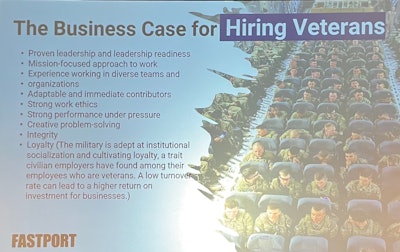 This slide from Fastport shown at the March 24 session at the Mid-America Trucking Show outlines many qualities that military veterans can bring to a fleet due to their training that non-veterans may not.
This slide from Fastport shown at the March 24 session at the Mid-America Trucking Show outlines many qualities that military veterans can bring to a fleet due to their training that non-veterans may not.
Mecca added, “the background he brings, his commitment, loyalty and just being a damn good human being.” Mecca said that’s what he sees in many of the company’s veteran drivers.
Matt Roland, the vice president of sales for Veterans in Trucking (VIT), outlined how his group works with fleets to make them more attractive to prospective military veteran drivers.
“We do the military-themed wrap, which recognizes the driver,” Roland said. “That driver becomes an advocate for the company. The wrap serves as recognition of the military driver. From there, we give additional decals for veterans. We introduce drivers to you as a company.”
VIT also has a job board where it lists companies that it works with in getting jobs for veterans transitioning out of the military. The group also helps fleets build custom landing pages online for veteran recruiting.
“If it’s custom – speaking the language of a veteran – you’ll get a higher response rate,” Roland noted.
Mecca noted that once a veteran hires on with a fleet, it’s important to show appreciation and treat them well.
“Take those moments [to] be intentional with veterans; to say ‘thank you,’” he said. “The most important part is to be genuine in who you are.”
Kevin Ridings, an executive vice president with Clean Harbors, echoed Mecca’s thoughts.
“Continue to make connections, protect the folks doing the job,” he said. “Sometimes we can get a little far removed from what the reality is. You’re servicing the person in that truck. Be willing to learn.”


